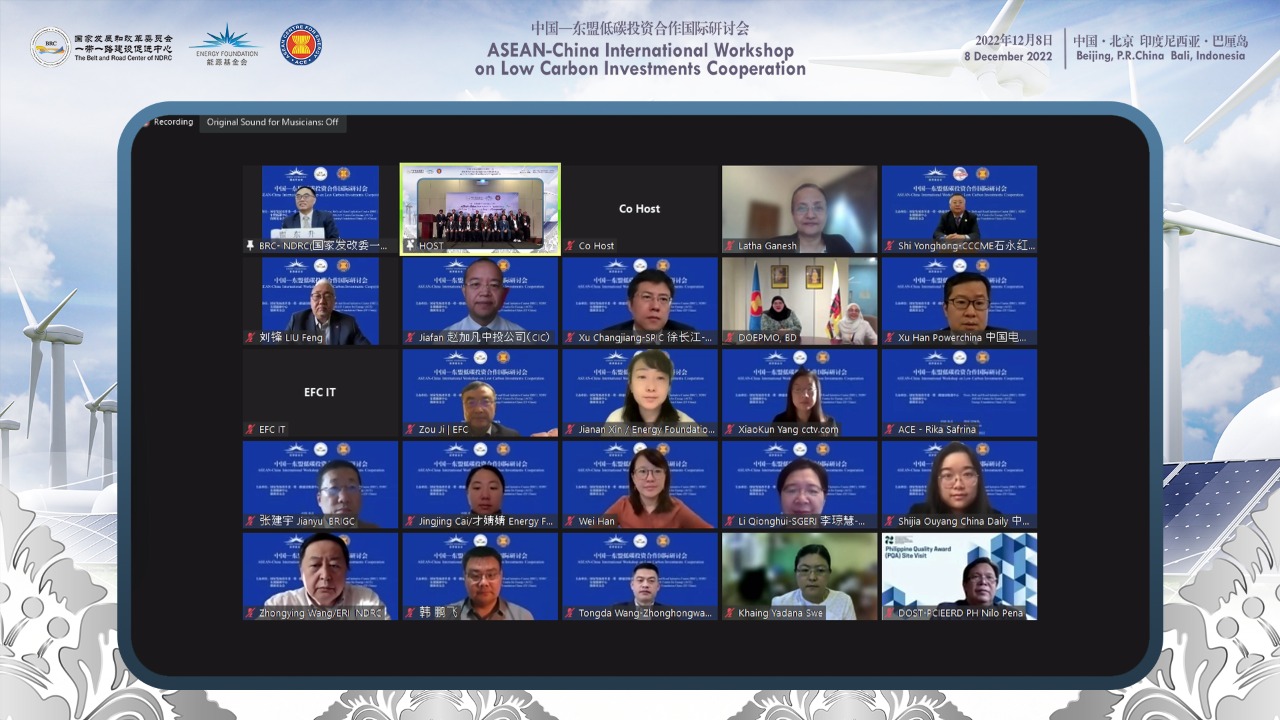Menu
China and Indonesia, 8 December 2022 (Photo: The ASEAN-China International Workshop on Low Carbon Investments Cooperation held in Beijing, PRC and Bali, Indonesia on 8 December 2022.)
(Photo: The ASEAN-China International Workshop on Low Carbon Investments Cooperation held in Beijing, PRC and Bali, Indonesia on 8 December 2022.)
The ASEAN-China International Workshop on Low Carbon Investments Cooperation was held in Bali, Indonesia, in a hybrid format on 8 December 2022. Co-organised by the ASEAN Center for Energy (ACE), the Belt and Road Center (BRC) of the National Development and Reform Commission (NDRC) of China, and the Energy Foundation China (EFC), this event brings together stakeholder representatives, policymakers, business leaders, experts and academics from ASEAN Member States (AMS) and China to mobilise investment to support low-carbon energy infrastructure in ASEAN and connect stakeholders between ASEAN and China.
The workshop started with Opening Remarks led by Mr. Zhai Dongsheng (Director General of BRC, NDRC), featuring Mr. Su Wei (Vice Secretary-General of NDRC), Dr. Ir. Dadan Kusdiana, M.Sc (Director General of New Renewable Energy and Energy Conservation, Ministry of Energy and Mineral Resources of Indonesia), Ms. Latha Ganesh (Senior Assistant Director and Alternate SOE Leader, External Relations, Energy Planning and Development Division, Energy Market Authority of Singapore), Prof. Zou Ji (CEO & President of EFC), and Dr. Nuki Agya Utama (Executive Director of ACE).
 (Photo: The ASEAN-China International Workshop on Low Carbon Investments Cooperation held in Beijing, PRC and Bali, Indonesia on 8 December 2022.)
(Photo: The ASEAN-China International Workshop on Low Carbon Investments Cooperation held in Beijing, PRC and Bali, Indonesia on 8 December 2022.)
The event was divided into three sections of panel discussions. The first session carrying the theme “Solving Energy Access” was hosted by Mr. Zhai Dongsheng. The session discussed the topic of energy transition potential and international cooperation under carbon neutrality, the current situation and prospect of ASEAN energy access, as well as the energy access and low-carbon development needs, as well as progress, challenges and policy need for overseas low-carbon investment cooperation. Dr. Ambiyah (Senior Officer of Energy Modelling and Policy Planning, ACE), when delivering her presentation on energy access stocktaking in ASEAN, mentioned the importance of AMS for reconstructing energy and investment policies and regulatory frameworks to meet the universal electrification and clean cooking access targets. Lao PDR has a National Energy Policy priority to develop the country’s hydropower potential, as mentioned by Dr. Anousak Phongsavath (Deputy Director General of Research Institute of Energy and Mines, Lao PDR). Move forward to Myanmar, H.E. U Than Zaw (Permanent Secretary of Ministry of Energy, Myanmar) believed energy security will fulfill the nation’s energy needs as the country has been also striving to explore not only natural gas but also other renewable resources, including solar, wind, and hydrogen.
The panel session was continued with the theme “Accelerating Renewables and Enhancing Power Grid” led by Ms. Han Wei, Director of Projects of EFC. This second session talked about policy incentives on overseas green investment for renewable energy technology development and power grid construction, as well as the current situation, challenges, and prospects for the development and international cooperation of renewables of ASEAN. Mr. Mohd Erwan bin Misran (Undersecretary of the Ministry of Natural Resources, Environment and Climate Change, Malaysia), highlighted the importance of low carbon goals to ensure opportunities and benefits from the energy transition, as well as to realise the importance of country awareness to quickly adapt, learn and has a strong desire towards an affordable, reliable, and sustainable energy for all.
The last session was moderated by Dr. Andy Tirta (Manager of Energy Modeling and Policy Planning, ACE), which discussed “Deploying Electric Transportation”. This third session elaborated more on the policy and international cooperation, as well as trade and investment in the technological innovation of transport electrification. The speakers from ASEAN stakeholders also presented the current situation and prospects for electric vehicle (EV) in the Southeast Asia region. The Philippines is actively promoting the energy-efficient electric vehicle (E-trike) project with market transformation, as stated by Mr. Patrick T. Aquino (Director of the Bureau of Energy Utilization Management, Philippines). The country is also developing accreditation protocol certification for minimum energy performance for EV. Meanwhile, Mr. Yongyooth Horthong (Head of Strategic International Cooperation Section 1 International Affairs Division of the Ministry of Energy, Thailand) conveyed his government’s next steps in low carbon development. One of them is by making predictable scenario plans and large investments/funds needed for future cooperation forward during the energy transition.
The workshop results will help develop new policy outcomes and opportunities to benefit the development of local low-carbon energy infrastructure in Southeast Asia and Chinese investment overseas. Moving forward, the activity is expected to support the future trends of green and low-carbon investment in the ASEAN Member States, and find out the needs and challenges companies face in making green and low-carbon investments. Moreover, it will provide a reference for ASEAN countries adapting policies direct green and low-carbon investment(DRY / RS)
